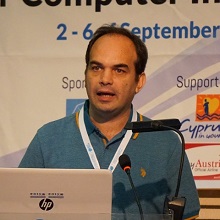Cyprus Interaction Lab
Cyprus University of Technology, Limassol Cyprus
Cyprus Interaction Lab
Cyprus University of Technology, Limassol Cyprus
This half-day tutorial will take you through the basics of prototyping with Arduino, the popular microprocessor platform used in interactive electronics prototyping, maker projects and educational technology using the Tinkercad virtual platform. This involves learning the basic functions of the Arduino programming environment and the microprocessor itself.
No prior knowledge or background in programming or electronics required.
In the first part of the tutorial, we will provide a brief background on electronics, the Arduino hardware and prototyping. Then we will proceed with a range of activities involving learning how to print on serial Monitor, LED Blinking Simulation, Push Button Simulation, Analog POT Simulation, Buzzer Simulation and LED RGB Simulation.
Participants will need to create free accounts on the Tinkercad platform and we will take you through a step-by-step approach to understanding programming in the Arduino Tinkercad environment. Both analog and digital inputs and outputs will be covered. We will also provide information about where to buy Arduino boards and kits.
Arduino has emerged as a popular teaching platform in various domains as well as a useful tool for rapid prototyping. The platform allows for exploring imaginative and unique solutions to various real-life issues with multiple applications involving physical and wearable technologies, IoT, interactive device design, HCI for health etc. Participants will learn the capabilities of this technology and be exposed to some of its many applications in an effort to include basic electronics prototyping methods in the HCI toolkit.
Indicative content and activities:
Learning Outcomes:
Target audience includes (but is not limited to): designers, engineers, teachers, researchers and hobbyists interested in creating interactive objects or environments. This is a beginner’s workshop but experienced Arduino enthusiasts are welcome to join-in. This workshop has no prerequisites. Good connection required.
https://www.tinkercad.com/ - we ask of the participants to create an account prior to joining the tutorial
Zoom link will be provided

Prof. Panayiotis Zaphiris is a Professor at the Department of Multimedia and Graphic Arts of the Cyprus University of Technology the Rector of the university. Before returning to Cyprus he was a Reader at the Centre for Human-Computer Interaction Design, School of Informatics of City University London where he still holds the title of Honorary Senior Visiting Fellow. Before City University, he was a researcher at the Institute of Gerontology at Wayne State University from where he also got his Ph.D. in Human Computer Interaction (HCI).

Andreas Papallas is a DPhil student at the University of Oxford and a practicing architect. He received his MPhil from the University of Cambridge with distinction and his BA from the University of Sheffield in architecture. He teaches co-creative design and design thinking at the MSc in Interaction Design of the Cyprus University of Technology. Andreas is a certified Design Sprint Facilitator (explorations.cyprusinteractionlab.com) and manages the first Makerspace in Cyprus.